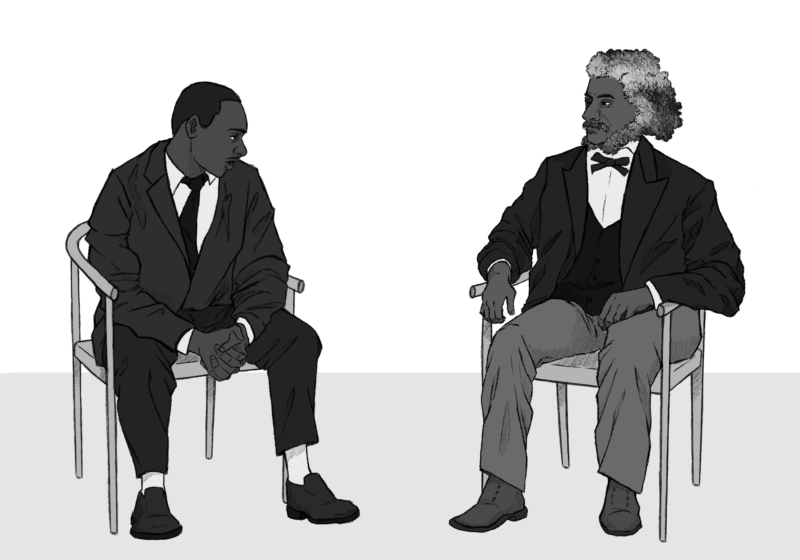History seemingly wants some of the most impactful voices in US history to stay in their lane. Frederick Douglass is a name as closely aligned with slavery as Martin Luther King Jr. is to segregation. While their legacy from combating those historical stains gets raised on a pedestal in the eyes of our culture, the true extent of their political advocacy goes much further. Before their deaths, and in parallel with their direct efforts at social justice, both men pushed for thorough economic policy measures as well. In light of MLK Day and Douglass’ upcoming birthday, I decided to explore their values and philosophies when applied to politics at large, rather than strictly slavery and segregation, to show just how expansive their advocacy truly was, especially for their time.
In 1856 and 1857, Douglass published two revolutionary essays on economics in his Rochester, New York-based publication, the “Frederick Douglass’ Paper,” both of which were only just recently transcribed and archived for the general public. His first essay,“The Accumulation of Wealth,” is about as explicit of a critique on wealth inequality and class disparity as you could expect, both from that time and even today’s standard. Douglass describes the concept of selfishness and the obsession with wealth in the American economy as caused by a fear of being permanently exploited for labor yourself, statings:
“A wider range of observation, however, including man everywhere, will show that with the vast majority of mankind, a satisfaction of the wants of nature is all that is sought; and even in those centres of selfishness spoken of, there are vast multitudes who would be thus satisfied, but that the rush and crash of the mighty machine of society compels them, in self-defence, to join in the rush for wealth. ’Tis the old question, ‘whether ’tis better to be a victim or a victimizer,’ and they decide against being victims.”
The second essay, “The Land Reformer”, deals with the concept of poverty and the link between the concentration of land ownership among the most wealthy and the inability to eradicate poverty conditions. He reacts to the current economic structure that he describes as, at best, treating the symptoms rather than the causes of poverty, noting:
“But what we want is not that poverty shall be promptly relieved, but that it shall be at once removed. Like the purchase of one or two individuals from Slavery, as is frequently done by benevolent minded individuals or communities, we are glad to see the manifestation of good feeling; but what we want is a preventative, not an ameliorator. We want the necessity for the purchase of men removed, and so with the necessity for relieving the poor. We want no poor.”
Douglass also proposes a vague land limitation law in order to provide equitable access to scarce land ownership opportunities. The underlying thesis of the essay, however, is how he feels no political interests at the time were concerned with addressing the true historically-bound causes of poverty, and were only content with addressing the symptoms while writing off the causes to “human nature.”
Martin Luther King Jr. likewise had a passionate interest in the evolution of general economic policy in the United States. In just a few minutes of his famous hour-long “Where Do We Go From Here?” speech on Aug. 16, 1967, King described the necessity of a guaranteed annual income (often referred to as a universal basic income, or UBI) in order to transform our economy into one that, at a minimum, secures people of all races, sexes, and classes their dignity and basic survival regardless of the availability of traditional labor. This concept has developed since then, but has been seen mostly as a fringe idea until a type of UBI was pushed by presidential primary candidate Andrew Yang in 2020.
Like Douglass, MLK was clearly motivated to not only secure racial equality in the United States, but to search for solutions that actually eradicated poverty conditions for all people in the United States. In the speech, he rails against the priorities of the modern United States government when he says, “If our nation can spend thirty-five billion dollars a year to fight an unjust, evil war in Vietnam, and twenty billion dollars to put a man on the moon, it can spend billions of dollars to put God’s children on their own two feet right here on earth.”
In his book of the same name as the speech, MLK also railed against the exploitation of third world resources at the sake of the profit motive of all industrialized economies, a practice that is still a global staple to this day, such as the internationally important child slave labor in the coltan and diamond mines of the Democratic Republic of Congo and Sierra Leone. He was globally minded and against exploitation of all kinds, not just the exploitation of African-Americans as it pertains to U.S. history.
Douglass and King were not just advocates for racial justice in their times, but revolutionary economic thinkers as well. Their ideas in this area were ostracized back then and continue to be overshadowed by the competing interests of both American parties. People of all ideologies tend to put these two men in a racial box, and look to their accomplishments within that topic as a source of comfort and moral self-confirmation.
When we take the time to learn of the true extent of the advocacy and beliefs of these men, however, it’s worth posing a question to ourselves. If these men truly had their finger on the pulse of American civil society before most did (as we are taught and celebrate them for), is it more likely that out of many potentially naive or misguided positions, they found only one to correctly advocate for, or were their insights on our society perhaps much more substantial and prophetic than history likes to admit? Study their words in full and decide for yourself.


